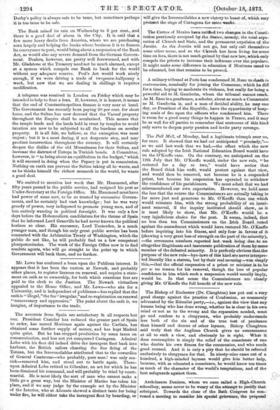The Bishop of Rochester (Dr. Clau,ghton) has put out a
very good charge against the practice of Confession, as commonly advocated by the Ritualist party,—i.e., against the view that any human being who has done wrong, whether he is clear in his own mind or not as to the wrong and the reparation needed, must go and confess to a clergyman, who probably understands. less both of the sin and of the true test of penitence than himself and dozens of other laymen. Bishop Claughton said truly that the Anglican Church gives no countenance at all to such a view, and obviously he is right. What it does contemplate is simply the relief of the conscience of one who doubts his own fitness for the communion, and who needs good counseL And it is only a pity that he should be referred exclusively to clergymen for that. In ninety-nine cases out of a hundred, a high-minded layman would give him better help, because, with as educated a conscience, he would know ten times as much of the character of the world's temptations, and of the best safeguards against them.


































 Previous page
Previous page